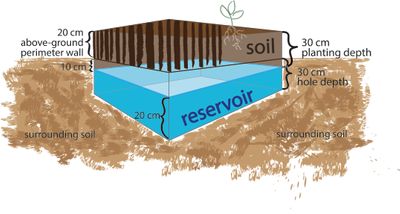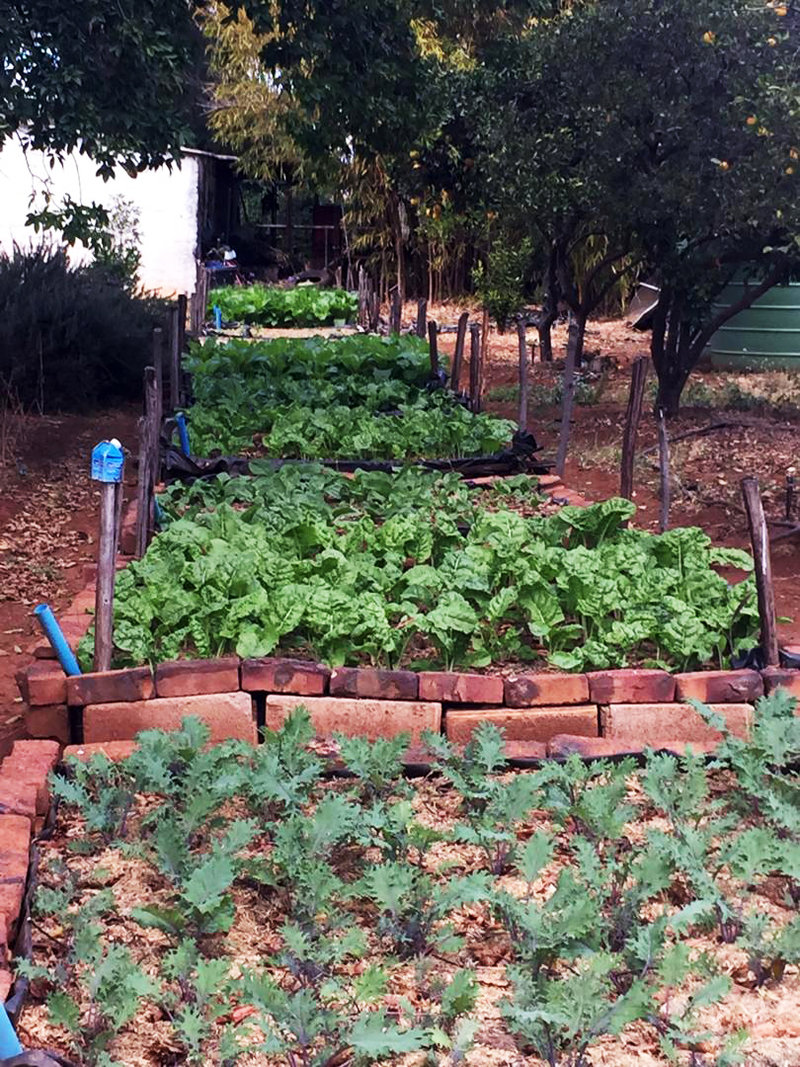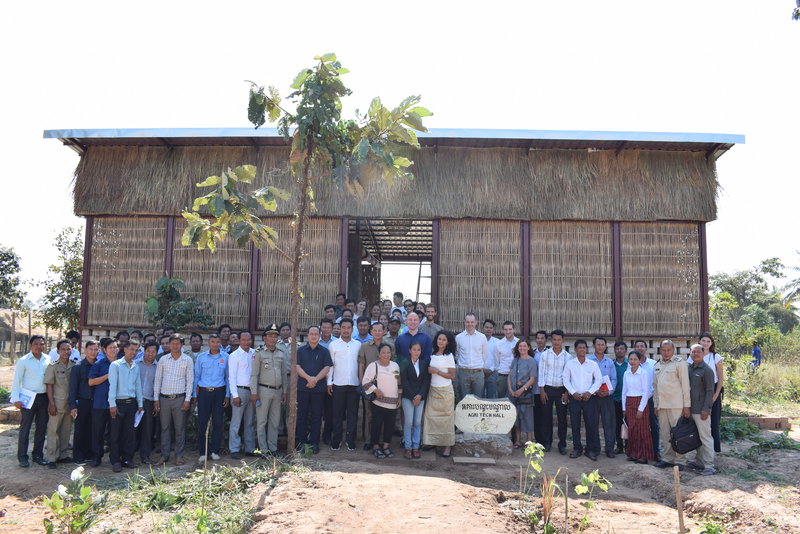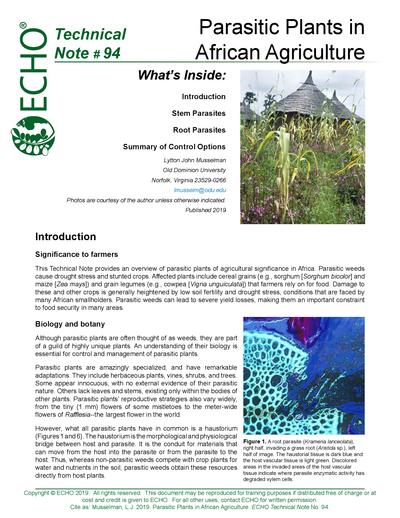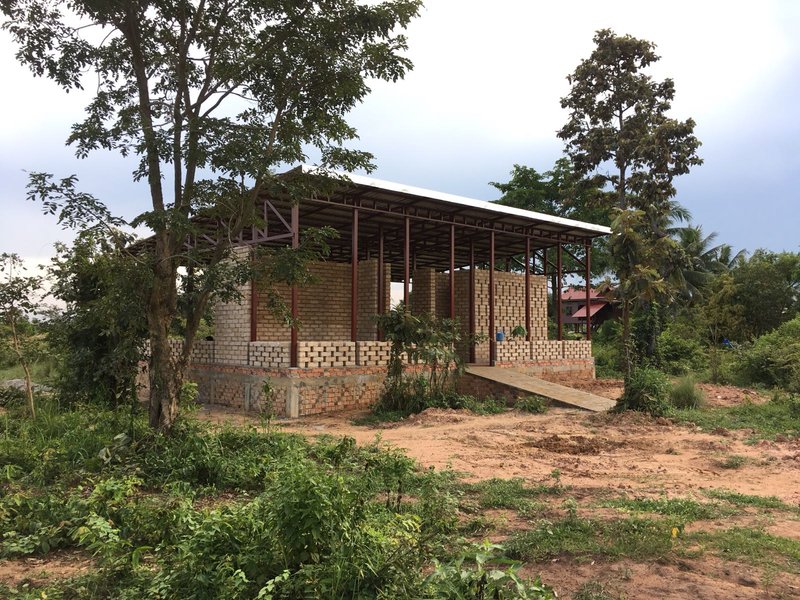Mises à jour de ECHOcommunity
TN #95 100-Fold Vegetable Gardens with Low-Cost Wicking Beds 2019-09-18
I discovered 100-fold gardens while researching ways to irrigate plants directly in the root zone. I wanted to know how to practically and affordably control some of the variables that influence plant growth, such as water availability and soil fertility. I read about “wicking beds,” which are watered from below as water moves up towards plants’ rooting zone from a reservoir lined with plastic. Watering from below prevents water loss while maintaining constant soil moisture and supplying water and nutrients in accordance with plant needs.
The wicking beds that I read about were primarily built above ground and used expensive containers and other materials. Proponents recommended potting soil to fill the beds. I began experimenting with local materials to reduce the cost of the beds. I did not want to have to purchase expensive containers or soil, so I decided to dig the beds 30 cm into the ground. That way, the ground would serve as the container, and we could sieve the soil from the hole and use it as the growing medium; it ends up being a fine growing medium that remains friable and that wicks water and nutrients well. We used the rocks and other large objects that were left in the sieve as part of the filler for the bottom of the beds. We were also able to dispose of old tin cans, bottles, broken glass, bones, etc. in the bottom part of the beds.
Seeds for a Future - Suchitepequez, Guatemala 2019-09-09
ECHOcommunity Network Member Spotlight
My name is Thomas and I work for Seeds for a Future in Suchitepequez, Guatemala. We have a very well-working nutrition program called "Casa-Granja" to support rural families on an improved healthy diet. Malnutrition and Food Insecurity create a vicious cycle of poverty from which it is very difficult to emerge. To help fight these twin evils, Seeds for a Future’s primary focus is helping rural families ensure their access to enough nutrition-packed food, so children and adults can be strong and healthy.
As with all of our projects, our first steps were to listen and learn. After a year of community meetings and small “get to know you” projects, we could see that an integrated approach was required. Just as food security, nutrition, family income, and health do not occur independently, our program approaches these sectors as parts of a whole.
EDN Issue 144 - Now Available 2019-07-25
In this issue:
- Introducing 100-Fold Gardens: Wicking Beds for High-Density Planting of Vegetables Where Water is Scarce
- Echoes from our Netwok: Literacy and Agriculture and Termite Harvesting in Ghana
- From ECHO's Seed Bank: Earthbag Houses for Storing Seeds
- Books, Web Sites, and Other Resources: Restoring the Soil, Second Edition Book Release
Introducing 100-Fold Gardens
Wicking Beds for High-Density Planting of Vegetables Where Water is Scarce
Dawn Berkelaar and Tim Motis
Excerpt:
Network member Lance Edwards works in Zimbabwe. He told us about using and promoting inexpensive, water-conserving planting beds that he calls 100-fold gardens. These are a type of “wicking bed”; they are lined with plastic so that water pools at the bottom in a reservoir. From there, water moves up towards the plants’ rooting zone. 100-fold gardens are a way to maximize vegetable production on raised beds.
Apaikunda’s Story 2019-07-16
Apaikunda is a mother of seven in the village of Ngyeku in Tanzania. Her husband has passed away, leaving her to care for the younger four of seven children on her own. In order to provide for them, Apaikunda works as a weeder for other people, as she does not own any land herself. The eldest three of her seven children have moved out of the house, living independently, one of whom is a brick maker. In addition to the challenges of being a single parent, Apaikunda is living with HIV.
Green Manure / Cover Crop Resources 2019-06-13
Green manure cover crops (gmcc) are rapidly growing crops that cover and protect the soil. There are a lot of great resources including and interactive selection tool for GMCCs on ECHOcommunity.org including an ECHO Technical Note on “Green Manure Cover Crops” and the GMCC Selection Tool.
Restoring The Soil: Second Edition Now Available 2019-05-23
Green manure/cover crops (gm/ccs) enrich the soil while providing numerous other benefits such as weed suppression and food for human and/or animal consumption. Understanding their functions, selecting gm/ccs for specific growing conditions, and knowing how to integrate them on small-scale farmsteads can be a daunting process. Roland Bunch's second edition of "Restoring the Soil" helps practitioners and farmers learn about gm/ccs and choose context-appropriate gm/cc systems already in use by farmers.
Part 1 of the book explains benefits and limitations of gm/ccs, common misconceptions, and mistakes made in using them. It discusses how gm/ccs relate to soil improvement, tropical agriculture, and climate-smart practices that sequester carbon and mitigate against drought.
Part 2 guides the reader through a unique, incremental decision-making process for selecting which of 117 gm/cc systems have the most potential for success in their setting.
EDN Issue 143 - Now Available 2019-04-26
In this issue:
- Learning about and from local seed systems
- Germination to Detoxify Jack Bean
- Techniques to Boost Plants’ Stress Tolerance and Extend Fruit Marketability
- From ECHO's Seed Bank: Fever Tree
- Books, Web Sites and Other Resources: Planetary Health Diet Proposal
Learning about and from Local Seed Systems
Dawn Berkelaar
Excerpt:
Access to viable seed is critical for successful farming. This is one reason our seed banks in Florida (USA), Thailand, and East Africa offer trial packets of seed to our network members. We have written about how to hold a seed fair, to enable people within a community to share and acquire seeds directly from each other. But what do we know about how seed normally flows throughout a small farming community?
Agriculture Training and Youth Motivation in NW Cambodia - Launch 2019-04-17
Guest Post by ECHOcommunity member: Muneezay Jaffery
This is part 3 of a series describing how one network organization is progressing with development of training facilities and curriculum.
The team are now doing village outreach work with banners and hand-outs at the ready. There are challenges at hand- are people interested? What sets us apart? How can we ensure regular attendance?
Parasitic Plants in African Agriculture - ECHO Technical Note #94 2019-03-27
ECHO's newest Technical Note, by Lytton John Musselman, provides an overview of parasitic plants of agricultural significance in Africa. Parasitic weeds cause drought stress and stunted crops. Important grains such as sorghum, maize, and cowpea are affected. Damage to these and other crops is worsened by low soil fertility and drought stress, conditions that are faced by many African smallholders. Parasitic weeds can lead to severe yield losses, making them an important constraint to food security in many areas.
Agriculture Training and Youth Motivation in NW Cambodia - Planning and Building 2019-03-12
Guest Post by ECHOcommunity member: Muneezay Jaffery
This is part 2 of a series describing how one network organization is progressing with development of training facilities and curriculum.
Whilst working on the planning and build, our aim was to “repackage” what horticulture means within a rural community. One main strategy was to include low cost, affordable tech within the space. Our bottom line for decision-making was “is it replicable? How much will it cost? What are the benefits?”
